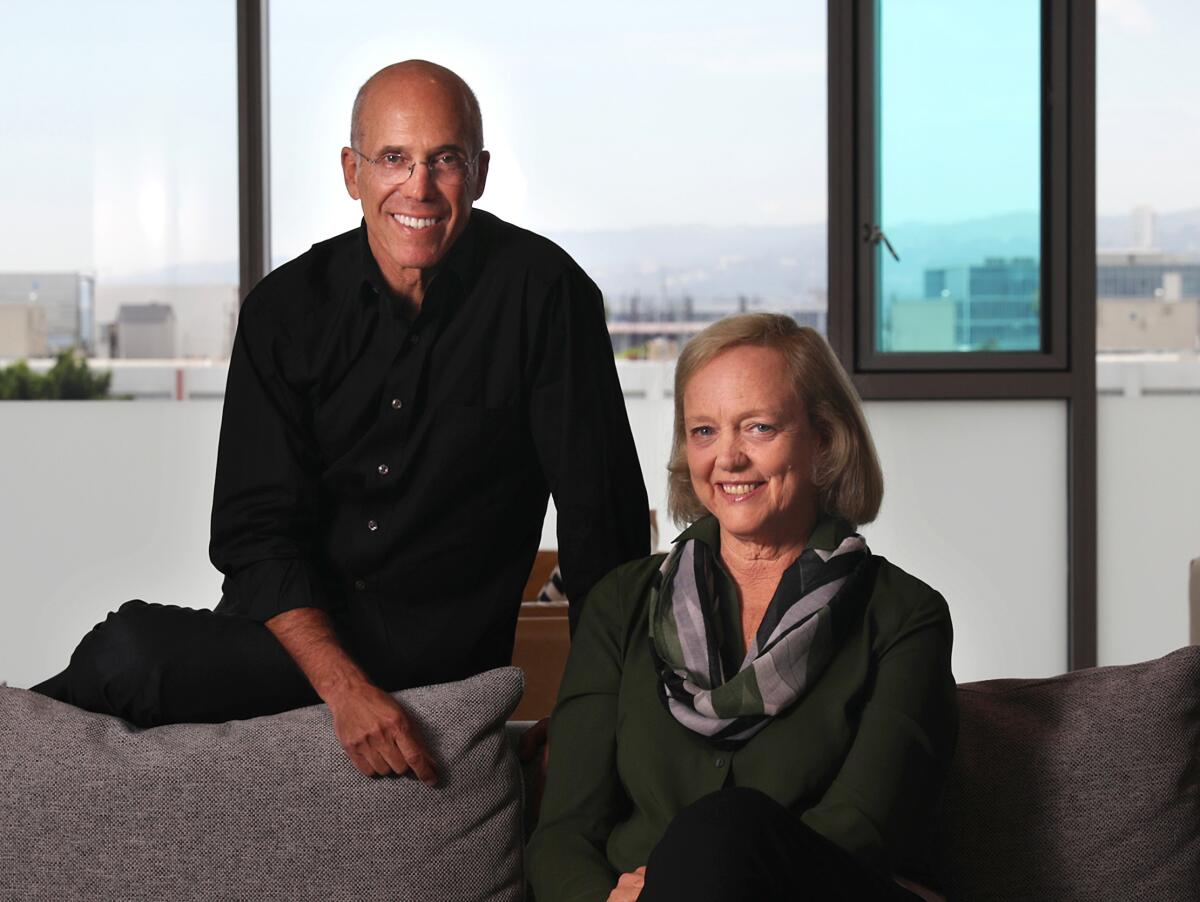Quibi raises $400 million to make more bite-sized shows

- Share via
LAS VEGAS — In a place known for high-stakes gambling, tech veteran Meg Whitman says she’s feeling even more confident these days about betting on the success of her streaming venture Quibi.
The video start-up, which launches in April, on Wednesday revealed it had raised $400 million from investors, which will help pay for content and marketing. The company, which previously raised $1 billion, did not disclose its investors.
“We have a lot of confidence,” Whitman said in an interview during CES, the consumer electronics show in Las Vegas. “I’m more confident certainly than I was two years ago, now that we have real content on a real app.”
Quibi, which is short for “quick bites” of video, aims to sell subscriptions to millennials and tell stories in bite-size chapters in 10 minutes or less. Its chairman is studio mogul Jeffrey Katzenberg and its investors include major studios such as Walt Disney Co. and WarnerMedia.
The company also disclosed it is working with Google, using the tech giant’s technology to help ensure Quibi’s video streams are seamless.
Quibi also has a partnership with T-Mobile that will include Quibi as part of the mobile phone company’s offering to customers. T-Mobile President and Chief Operating Officer Mike Sievert said customers will learn about Quibi through T-Mobile’s app, its retail reps at its stores and through its thank you program, T-Mobile Tuesdays.
“Our customers have an insatiable demand for what Quibi is going to bring,” Sievert said.
Quibi charges $4.99 for its service with ads and $7.99 a month without ads. Its videos are an eclectic mix, including long-form narratives distributed in short chapters, reality programs, documentaries and food shows, as well as daily news programs targeting millennials from NBC News. In its first year Quibi expects to roll out 175 shows and 8,500 episodes.
The company is working with such major filmmakers as Steven Spielberg, Catherine Hardwicke and Antoine Fuqua on programs specifically designed for mobile phones. “Spielberg’s After Dark” series appears on the service only at night. Viewers can also change what they see in Quibi programs by holding their phones vertically or horizontally.
Many people in the industry view Quibi as a gamble.
If it is successful, it could dramatically change the way high-quality productions are distributed.
But other companies, including Verizon’s go90 platform, have tried to target premium content to mobile phone users, only to fail when they could not attract a large enough audience for advertisers.
Quibi executives believe there will be strong demand for its service as people spend more time on their mobile phones.
There has been a surge of interest in content made for mobile phones on free platforms such as TikTok, but those services rely on user-generated content. Quibi is focused on high-quality productions, paying as much as $6 million an hour for long-form narrative content.
Whitman believes that if users watch at least three Quibi videos a day, that could be enough to encourage them to stay on the service.
Some analysts, however, are skeptical since many mobile phone-oriented video streaming services are free.
Whitman said that while Quibi is not profitable now, it does have a clear path to profitability.
“We would like to build this company and run it and maybe take it public one day,” Whitman said.
More to Read
Inside the business of entertainment
The Wide Shot brings you news, analysis and insights on everything from streaming wars to production — and what it all means for the future.
You may occasionally receive promotional content from the Los Angeles Times.











